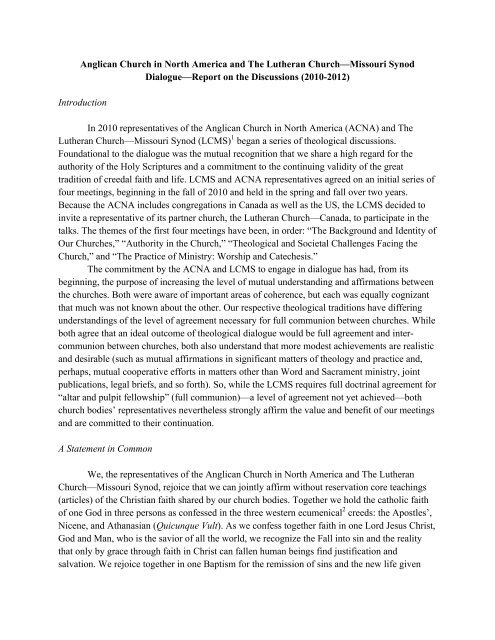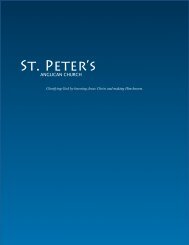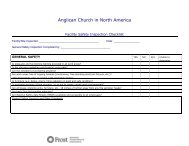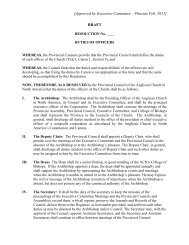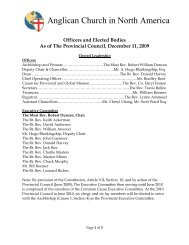Anglican Church in North America and The Lutheran Church ...
Anglican Church in North America and The Lutheran Church ...
Anglican Church in North America and The Lutheran Church ...
You also want an ePaper? Increase the reach of your titles
YUMPU automatically turns print PDFs into web optimized ePapers that Google loves.
<strong>Anglican</strong> <strong>Church</strong> <strong>in</strong> <strong>North</strong> <strong>America</strong> <strong>and</strong> <strong>The</strong> <strong>Lutheran</strong> <strong>Church</strong>—Missouri Synod<br />
Dialogue—Report on the Discussions (2010-2012)<br />
Introduction<br />
In 2010 representatives of the <strong>Anglican</strong> <strong>Church</strong> <strong>in</strong> <strong>North</strong> <strong>America</strong> (ACNA) <strong>and</strong> <strong>The</strong><br />
<strong>Lutheran</strong> <strong>Church</strong>—Missouri Synod (LCMS) 1 began a series of theological discussions.<br />
Foundational to the dialogue was the mutual recognition that we share a high regard for the<br />
authority of the Holy Scriptures <strong>and</strong> a commitment to the cont<strong>in</strong>u<strong>in</strong>g validity of the great<br />
tradition of creedal faith <strong>and</strong> life. LCMS <strong>and</strong> ACNA representatives agreed on an <strong>in</strong>itial series of<br />
four meet<strong>in</strong>gs, beg<strong>in</strong>n<strong>in</strong>g <strong>in</strong> the fall of 2010 <strong>and</strong> held <strong>in</strong> the spr<strong>in</strong>g <strong>and</strong> fall over two years.<br />
Because the ACNA <strong>in</strong>cludes congregations <strong>in</strong> Canada as well as the US, the LCMS decided to<br />
<strong>in</strong>vite a representative of its partner church, the <strong>Lutheran</strong> <strong>Church</strong>—Canada, to participate <strong>in</strong> the<br />
talks. <strong>The</strong> themes of the first four meet<strong>in</strong>gs have been, <strong>in</strong> order: “<strong>The</strong> Background <strong>and</strong> Identity of<br />
Our <strong>Church</strong>es,” “Authority <strong>in</strong> the <strong>Church</strong>,” “<strong>The</strong>ological <strong>and</strong> Societal Challenges Fac<strong>in</strong>g the<br />
<strong>Church</strong>,” <strong>and</strong> “<strong>The</strong> Practice of M<strong>in</strong>istry: Worship <strong>and</strong> Catechesis.”<br />
<strong>The</strong> commitment by the ACNA <strong>and</strong> LCMS to engage <strong>in</strong> dialogue has had, from its<br />
beg<strong>in</strong>n<strong>in</strong>g, the purpose of <strong>in</strong>creas<strong>in</strong>g the level of mutual underst<strong>and</strong><strong>in</strong>g <strong>and</strong> affirmations between<br />
the churches. Both were aware of important areas of coherence, but each was equally cognizant<br />
that much was not known about the other. Our respective theological traditions have differ<strong>in</strong>g<br />
underst<strong>and</strong><strong>in</strong>gs of the level of agreement necessary for full communion between churches. While<br />
both agree that an ideal outcome of theological dialogue would be full agreement <strong>and</strong> <strong>in</strong>tercommunion<br />
between churches, both also underst<strong>and</strong> that more modest achievements are realistic<br />
<strong>and</strong> desirable (such as mutual affirmations <strong>in</strong> significant matters of theology <strong>and</strong> practice <strong>and</strong>,<br />
perhaps, mutual cooperative efforts <strong>in</strong> matters other than Word <strong>and</strong> Sacrament m<strong>in</strong>istry, jo<strong>in</strong>t<br />
publications, legal briefs, <strong>and</strong> so forth). So, while the LCMS requires full doctr<strong>in</strong>al agreement for<br />
“altar <strong>and</strong> pulpit fellowship” (full communion)—a level of agreement not yet achieved—both<br />
church bodies’ representatives nevertheless strongly affirm the value <strong>and</strong> benefit of our meet<strong>in</strong>gs<br />
<strong>and</strong> are committed to their cont<strong>in</strong>uation.<br />
A Statement <strong>in</strong> Common<br />
We, the representatives of the <strong>Anglican</strong> <strong>Church</strong> <strong>in</strong> <strong>North</strong> <strong>America</strong> <strong>and</strong> <strong>The</strong> <strong>Lutheran</strong><br />
<strong>Church</strong>—Missouri Synod, rejoice that we can jo<strong>in</strong>tly affirm without reservation core teach<strong>in</strong>gs<br />
(articles) of the Christian faith shared by our church bodies. Together we hold the catholic faith<br />
of one God <strong>in</strong> three persons as confessed <strong>in</strong> the three western ecumenical 2 creeds: the Apostles’,<br />
Nicene, <strong>and</strong> Athanasian (Quicunque Vult). As we confess together faith <strong>in</strong> one Lord Jesus Christ,<br />
God <strong>and</strong> Man, who is the savior of all the world, we recognize the Fall <strong>in</strong>to s<strong>in</strong> <strong>and</strong> the reality<br />
that only by grace through faith <strong>in</strong> Christ can fallen human be<strong>in</strong>gs f<strong>in</strong>d justification <strong>and</strong><br />
salvation. We rejoice together <strong>in</strong> one Baptism for the remission of s<strong>in</strong>s <strong>and</strong> the new life given
through this sacrament. In the confession of these truths, we also recognize <strong>and</strong> affirm that they<br />
are known through the Holy Scriptures of the Old <strong>and</strong> New Testaments, the very Word of God<br />
written, which are the <strong>in</strong>fallible basis for all church teach<strong>in</strong>g.<br />
Because of these significant areas of agreement, our churches recognize certa<strong>in</strong> grave,<br />
particular challenges that we face today. <strong>The</strong>se <strong>in</strong>clude, but are not limited to the follow<strong>in</strong>g:<br />
� We recognize a widespread failure to affirm the biblical teach<strong>in</strong>g of the creation of man<br />
<strong>and</strong> woman, the significance of our embodiment as male <strong>and</strong> female, <strong>and</strong> the<br />
complementarity of man <strong>and</strong> woman with<strong>in</strong> one humanity.<br />
� We recognize a pervasive threat to the underst<strong>and</strong><strong>in</strong>g of marriage as the life-long union of<br />
a man <strong>and</strong> woman as husb<strong>and</strong> <strong>and</strong> wife <strong>and</strong> oppose any efforts to redef<strong>in</strong>e marriage <strong>in</strong><br />
any other terms.<br />
� We recognize that Western Christianity is threatened with <strong>in</strong>creas<strong>in</strong>g apostasy, deny<strong>in</strong>g<br />
the ecumenical consensus even <strong>in</strong> such central truths as the doctr<strong>in</strong>e of the Tr<strong>in</strong>ity, the<br />
sav<strong>in</strong>g work of Christ, <strong>and</strong> the moral consensus Christians had <strong>in</strong> common for millennia.<br />
� We recognize the threat to Christian evangelism <strong>and</strong> outreach caused by those forces<br />
which view the confession of one Lord, one faith, one Baptism as “<strong>in</strong>tolerance.”<br />
� We recognize the gift of sexual expression <strong>and</strong> affirm the biblical teach<strong>in</strong>g that God<br />
<strong>in</strong>tends sexuality only to be fully enacted with<strong>in</strong> the sanctity of marriage between one<br />
man <strong>and</strong> one woman. We oppose efforts with<strong>in</strong> society or by some churches to view<br />
other sexual relationships as moral alternatives to heterosexual marriage.<br />
� We recognize the need to promote chastity before marriage, as well as the biblical call to<br />
celibacy to those who are unmarried or to those who have given themselves to serv<strong>in</strong>g<br />
Christ <strong>in</strong> this way <strong>in</strong> everyday life or <strong>in</strong> religious community.<br />
� We recognize a cont<strong>in</strong>u<strong>in</strong>g threat to the most vulnerable of human be<strong>in</strong>gs, especially the<br />
unborn, the ag<strong>in</strong>g, <strong>and</strong> the term<strong>in</strong>ally ill, but also to those who suffer from calamity,<br />
poverty, sickness, persecution, <strong>and</strong> need.<br />
� We recognize the need to exercise a biblically responsible stewardship of creation<br />
without any idolization of the natural world.<br />
On the basis of our mutual recognition of such challenges, we believe our churches<br />
should consider ways <strong>in</strong> which we may work together <strong>in</strong> the future. <strong>The</strong> practical implementation<br />
of the grow<strong>in</strong>g relationship between the LCMS <strong>and</strong> the ACNA may take various forms, from<br />
practical matters such as shar<strong>in</strong>g build<strong>in</strong>gs to such deeper concerns as a commitment to pray for<br />
each other’s congregations, <strong>in</strong>stitutions, <strong>and</strong> other m<strong>in</strong>istries. Denom<strong>in</strong>ationally we look toward<br />
the possibility of jo<strong>in</strong>t statements on important issues fac<strong>in</strong>g our churches <strong>and</strong> our culture such as<br />
questions about homosexuality <strong>and</strong> abortion. We also anticipate opportunities to work together to<br />
address human needs like hunger, homelessness, <strong>and</strong> other m<strong>in</strong>istries of mercy toward those <strong>in</strong><br />
crisis.
One example of cooperative work that is presently be<strong>in</strong>g explored <strong>in</strong>volves publications.<br />
Concordia Publish<strong>in</strong>g House is <strong>in</strong> discussion with an ACNA jurisdiction to see whether CPH<br />
might facilitate the publication of a hymnal supplement for use <strong>in</strong> the ACNA. Our sem<strong>in</strong>aries are<br />
explor<strong>in</strong>g ways to support our common mission by not only host<strong>in</strong>g the present series of<br />
dialogues but also the possibility of jo<strong>in</strong>t courses or colloquies that help us learn about <strong>and</strong> from<br />
each other while address<strong>in</strong>g issues of common concern. As church bodies we are committed to<br />
explor<strong>in</strong>g ways we can support our brothers <strong>and</strong> sisters <strong>in</strong> Christ <strong>in</strong> proclaim<strong>in</strong>g God's truth <strong>and</strong><br />
love <strong>in</strong> a world that so desperately needs Him.<br />
F<strong>in</strong>ally, our churches have together identified areas about which we have differ<strong>in</strong>g views<br />
<strong>and</strong> about which we may profitably engage <strong>in</strong> further study <strong>and</strong> discussion. Some examples of<br />
areas for further conversation <strong>in</strong>clude:<br />
� We recognize that we do not have the same underst<strong>and</strong><strong>in</strong>g of the need for, approach to, or<br />
value of authoritative theological confessions <strong>in</strong> addition to the creeds.<br />
o <strong>Lutheran</strong>s have unreserved subscription to the creeds <strong>and</strong> dogmatic def<strong>in</strong>itions of<br />
the first four ecumenical councils. <strong>The</strong> LCMS also highly values <strong>and</strong> requires<br />
unreserved subscription to the Book of Concord.<br />
o <strong>Anglican</strong>s have unreserved subscription to the creeds <strong>and</strong> the dogmatic def<strong>in</strong>itions<br />
of the first four ecumenical councils. <strong>The</strong> <strong>Anglican</strong> <strong>Church</strong> <strong>in</strong> <strong>North</strong> <strong>America</strong><br />
place a high value on the authority of the Book of Common Prayer <strong>and</strong> the Thirtyn<strong>in</strong>e<br />
Articles of Religion; however the <strong>Anglican</strong> church has historically not been<br />
confessional <strong>in</strong> the same way as the <strong>Lutheran</strong> <strong>Church</strong>.<br />
� We recognize that further discussion is needed regard<strong>in</strong>g issues of ecclesiology <strong>and</strong> the<br />
office(s) of m<strong>in</strong>istry.<br />
o Further exploration of the underst<strong>and</strong><strong>in</strong>g of the office of bishop (its def<strong>in</strong>ition,<br />
nature, <strong>and</strong> necessity) is needed.<br />
o Disagreement exists among <strong>Anglican</strong>s about the propriety of orda<strong>in</strong><strong>in</strong>g women to<br />
the pastoral (presbyteral) office, while the LCMS opposes this practice. 3<br />
� We recognize that further discussion is needed regard<strong>in</strong>g our respective underst<strong>and</strong><strong>in</strong>gs<br />
of the real presence of Christ <strong>in</strong> the Lord’s Supper <strong>and</strong> the adm<strong>in</strong>istration of this<br />
sacrament.<br />
� We recognize that we have differ<strong>in</strong>g levels of appreciation for <strong>and</strong> usage of the western<br />
liturgy.<br />
o <strong>Anglican</strong>s follow <strong>The</strong> Book of Common Prayer with a great measure of<br />
uniformity.<br />
o <strong>Lutheran</strong>s currently exhibit a greater variety <strong>in</strong> liturgical practice <strong>and</strong> some<br />
significant <strong>in</strong>ternal disagreements about the conduct of worship.
We appeal to the laity <strong>and</strong> clergy of our two communions to take to heart the develop<strong>in</strong>g<br />
relationship between us, foster<strong>in</strong>g our mutual bonds by personal <strong>and</strong> group contacts, by each side<br />
becom<strong>in</strong>g better <strong>in</strong>formed <strong>and</strong> more appreciative of the other, by support<strong>in</strong>g each other, <strong>and</strong> by<br />
seek<strong>in</strong>g opportunities for common study of God’s Word <strong>and</strong> prayer. May the Lord <strong>in</strong> his good<br />
time grant more than our weak eyes can envisage or our dull hearts conceive.<br />
1 As noted above <strong>in</strong> the first paragraph, the LCMS has been jo<strong>in</strong>ed <strong>in</strong> this dialogue by a representative of the<br />
<strong>Lutheran</strong> <strong>Church</strong>—Canada. For the sake of convenience, references to “LCMS” <strong>in</strong> the body of this document should<br />
be understood to <strong>in</strong>clude also the theological perspective of the LCC. Bishop Ray Sutton, Dr. Jonathan Riches, <strong>and</strong><br />
Bishop Wes Nolden serve as representatives of the ACNA. Dr. Albert Collver, Dr. Joel Lehenbauer, Dr. Lawrence<br />
Rast, Dr. Frederic Baue, <strong>and</strong> Rev. Larry Vogel are the official representatives of the LCMS, while Dr. John<br />
Stephenson was the representative of the LCC.<br />
2 We wish to dist<strong>in</strong>guish here<strong>in</strong> between "ecumenical" (referr<strong>in</strong>g to what is universal or catholic) <strong>and</strong> "ecumenical"<br />
(referr<strong>in</strong>g to the work of theological dialogue between different church traditions).<br />
3 LCMS/LCC representatives have discerned agreement with the majority <strong>in</strong> ACNA <strong>in</strong> regards to this issue.<br />
Although presbyteral ord<strong>in</strong>ation for women occurs <strong>in</strong> ACNA, a majority of ACNA bishops reserve presbyteral<br />
ord<strong>in</strong>ation only for men.


